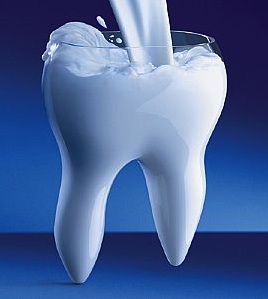Calcium is essential for healthy bones and teeth! You’ve heard it before, but how much calcium are you actually getting?
An extremely important mineral for dental and overall health, calcium aids in preventing dental problems and osteoporosis. Actually, 99 percent of the calcium found in our bodies is located in our bones and teeth! But calcium does so much more — it also helps with blood clotting, sending nerve signals, releasing hormones and enzymes, as well as muscle and blood vessel contraction and relaxation.
Them Bones, Them Bones…
Much like we change our hairstyles or clothes to resemble the latest fashions, our bones are constantly reinventing themselves. Our bones are continuously undergoing a process called resorption, which is the breakdown of bone tissue. When bone is lost, calcium is deposited to help new bone form. In order to best utilize new bone formation, calcium needs to be taken continuously, and over a long period of time.
As we age, we tend to lose more bone, and it becomes harder for calcium to keep up with our changing bodies. If there’s not a significant amount of calcium, our bones can become brittle and porous in old age. The weaker our skeletal systems, the greater our chances of ending up with bone fractures or jaw deterioration, which leads to tooth loss. And the more the jaw deteriorates, the harder it is for your mouth to support dental restorations, such as dental implants and dentures.
Calcium is equally important to your periodontal health! According to the American Academy of Periodontology, a diet low in calcium can increase your chances of getting gum disease. An infection caused by bacteria that attack your gums, periodontal disease will eventually break down your gum tissue and destroy the surrounding bone. As calcium supports your jawbone, it strengthens it against the bacteria that lead to gum disease and eventual tooth loss. Combined with gum disease treatment, a significant calcium intake can prevent gum disease from progressing.
Step It Up
Calcium intake varies according to age and need — your doctor can let you know how much calcium should be included in your diet. But on average, adults need about 1200 mg a day, and shouldn’t exceed 2500 mg per day. That may not sound like a lot, but unfortunately, studies show most people aren’t including enough calcium.
Consuming at least three servings of calcium-laden foods will help you meet your daily requirements. If you need to increase the level of calcium in your diet, there are several sources for you to choose from.
Here are foods high in calcium:
Dairy — The most significant source of calcium, dairy products are an essential part of your daily diet. Milk, cheese and yogurt are all excellent sources of calcium.
Veggies — Green, leafy vegetables such as broccoli, kale, spinach and Chinese cabbage also have high calcium content.
Fish — Salmon, shellfish and canned sardines that include the soft bone contribute to your calcium intake.
Other Sources — There are so many more sources that contain calcium, including almonds, dried beans and tofu. These alone won’t meet your daily requirements, but combined with other sources they will increase your calcium levels, and every little bit counts! Some products, such as breads and orange juice, have calcium added as a substitute to dairy as well.
Vitamins — Although health professionals prefer you obtain calcium through a balanced diet, supplements are available to help you meet your needs.
And don’t forget to add the Vitamin D! Often absorbed through the skin from sunlight, it helps your body absorb calcium. Vitamin D is also added to milk and supplements so you can maintain proper levels of calcium in your bones and teeth.
No Excuses
If you’re worried about fat intake from milk and cheeses, don’t let it affect your diet! Calcium is actually linked to a lower body mass, and the benefits far outweigh the risk of adding a few extra pounds. If you must decrease your calorie intake, skim milk provides as much calcium as whole milk, with less fat per serving. And if you believe you’re lactose intolerant, consult a doctor for a diagnosis. Lactose-free milk and products that aid in digestion can help you get the calcium you need.
Need another reason to make sure you’re getting enough calcium? Without the proper amount, you could end up with a calcium deficiency, and you already know where that can lead. So unless you’re looking forward to a hip replacement or full set of dentures, you may want re-evaluate what role calcium plays in your diet. It’s never too late to start focusing on your health!

